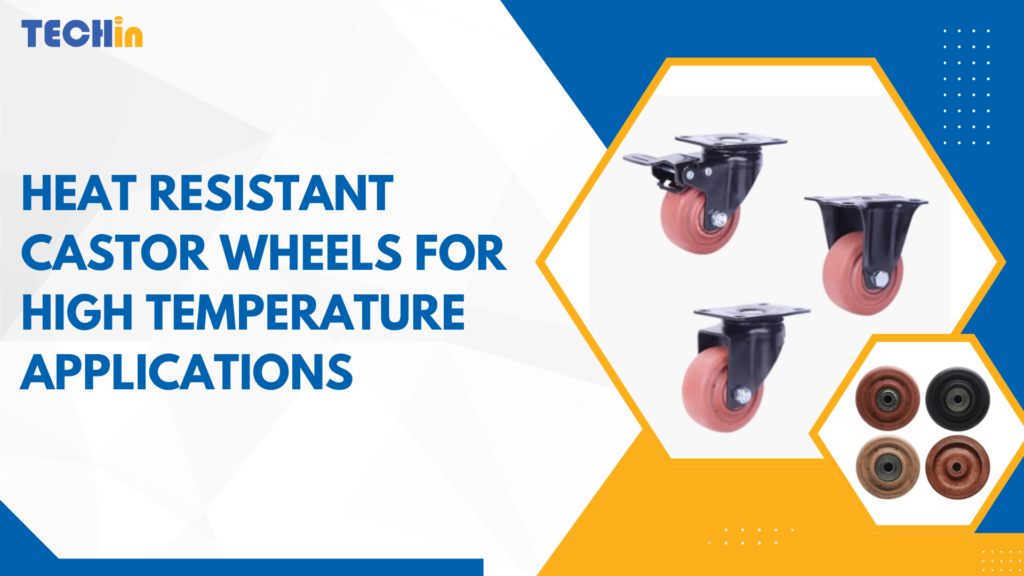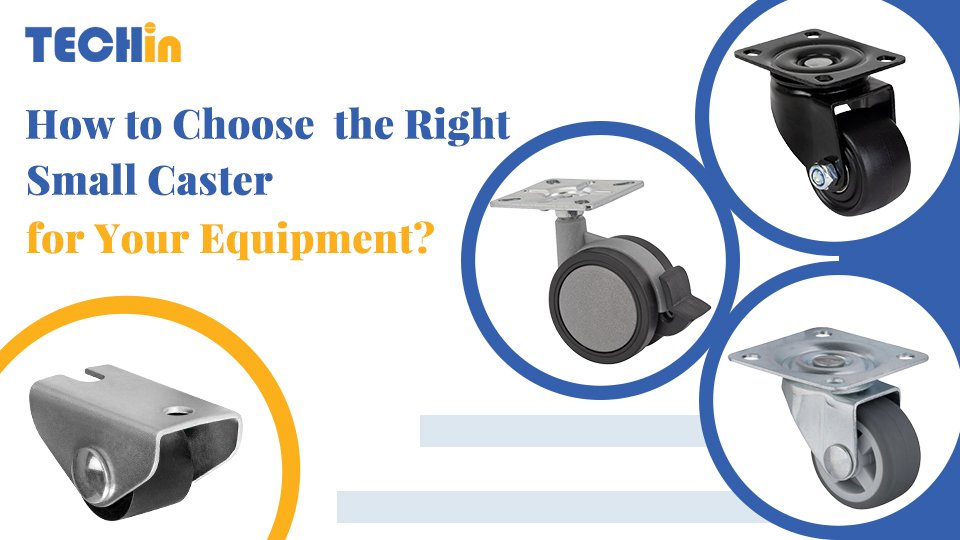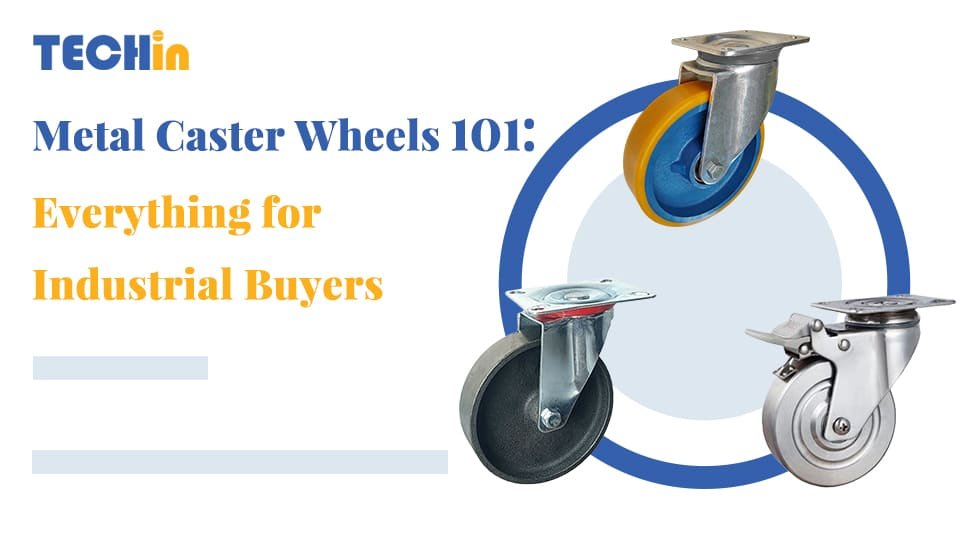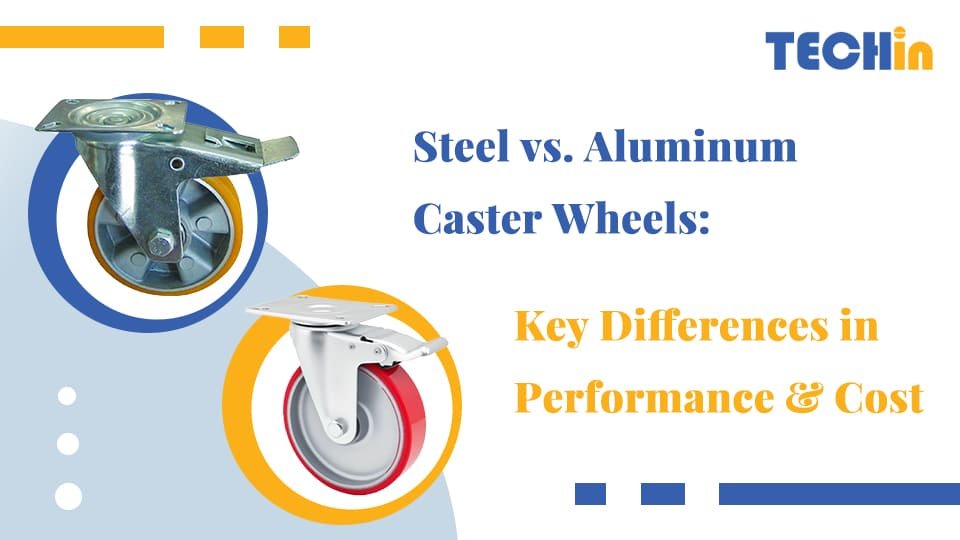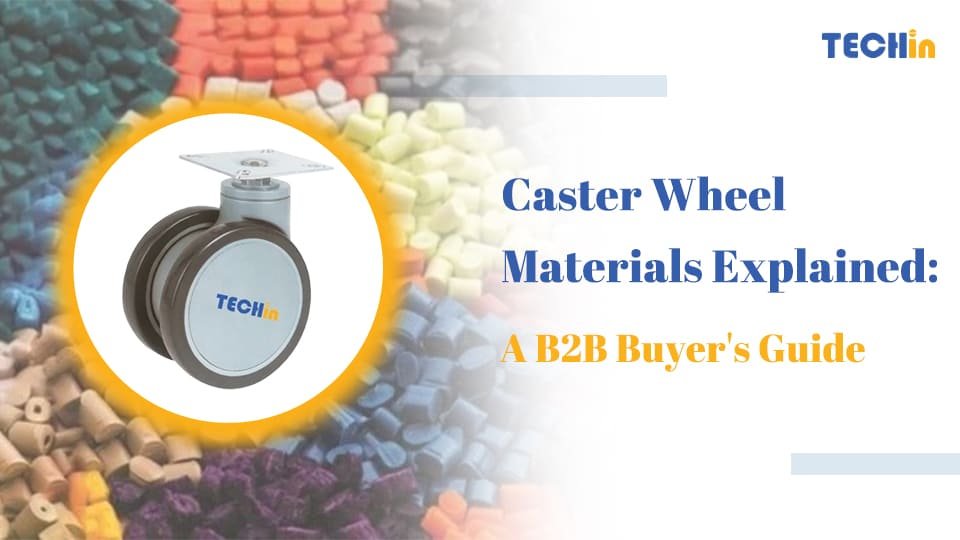1. Introduction
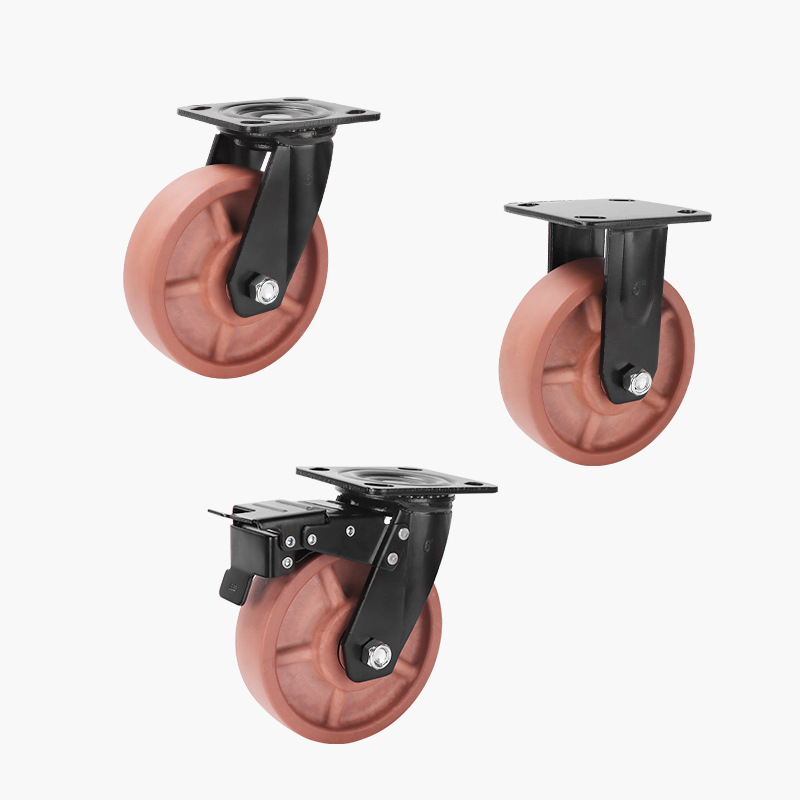
When equipment is exposed to extreme heat, regular wheels can fail, causing expensive breakdowns and unsafe working conditions. Heat resistant castor wheels are a must-have in industries that deal with high-temperature environments. These wheels are designed to withstand extreme heat, keep working, and roll smoothly.
In this article, we’ll look at the different types of heat resistant castor wheels, what they’re made of, and how to choose the right one for you.
2. What Are Heat Resistant Castor Wheels?
Heat-resistant castor wheels are made to withstand high temperatures that would ordinarily cause standard wheels to deteriorate or melt. They are made from materials that not only withstand heat, but also maintain their strength, flexibility and other properties vital to long-lasting operation. If not for these types of wheels, businesses in industries ranging from food to metalworking and automotive could experience serious operational problems.
2.1. Advantages of Heat Resistant Castor Wheels:
- Enhanced Durability: These wheels can operate at higher temperatures without losing their structural integrity, making them ideal for environments such as ovens, foundries, or autoclaves.
- Reduced Downtime: By preventing wheel failures in high-temperature settings, heat-resistant wheels minimize downtime, contributing to smoother, more efficient operations.
- Cost-Efficiency: Though they come with a higher upfront cost, their longevity and reduced need for replacements can save money in the long run.
2.2. Disadvantages:
- Higher Initial Cost: Heat resistant castor wheels tend to be more expensive compared to regular castors, making them a larger initial investment.
- Material Limitations: While they excel in high-temperature environments, each material has specific temperature and load tolerances, so you must select the right one for your application.
3. What Materials Are Heat Resistant Castor Wheels Made Of?
The materials used in manufacturing heat resistant castor wheels are selected based on their ability to withstand high temperatures, mechanical wear, and various load-bearing conditions. Here’s a detailed look at the materials commonly used for heat resistant castor wheels:
3.1. Glass-filled Nylon
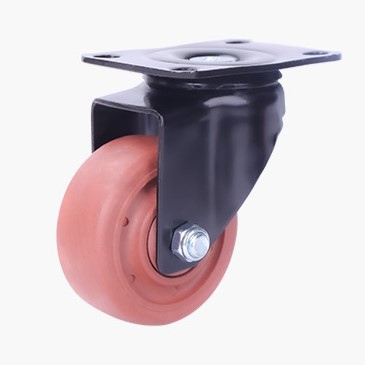
- Temperature Tolerance: Up to 175°C (350°F)
- Best For: Light-duty applications where moderate heat is involved, such as bakeries or food production facilities.
- Material Characteristics:
- Glass-filled nylon is a lightweight yet durable material, making it suitable for environments where heat is present but not extreme.
- The addition of glass fibers enhances the strength and load capacity of the nylon, making it a good choice for moderate-weight equipment.
- Applications: Ideal for use in bakery trolleys, food production lines, and material handling carts.
3.2. Phenolic Resin
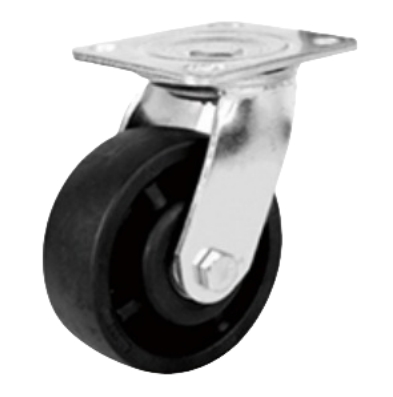
- Temperature Tolerance: Up to 230°C (450°F)
- Best For: Medium-duty applications in industries like aerospace, automotive, or even in the pharmaceutical industry.
- Material Characteristics:
- Phenolic resin is known for its high heat resistance, offering robust mechanical properties even at elevated temperatures.
- It has high compressive strength, making it suitable for handling moderate to heavy loads under heat.
- Applications: Used in autoclaves, manufacturing ovens, and heavy-duty industrial applications that require a balance of heat resistance and strength.
3.3. Cast Iron
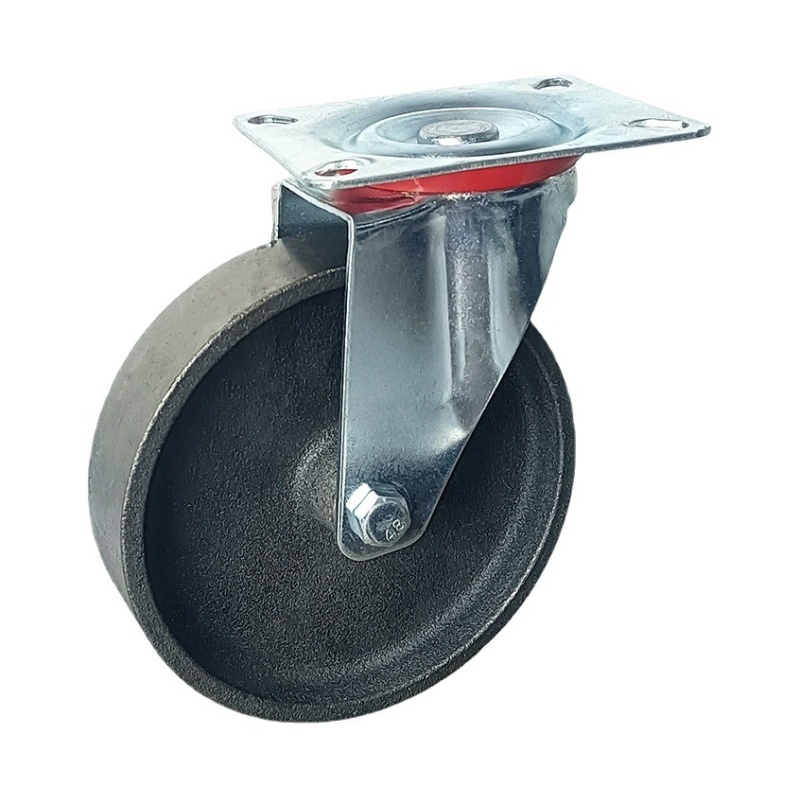
- Temperature Tolerance: Up to 315°C (600°F)
- Best For: Heavy-duty applications, such as in steel mills, foundries, and heavy manufacturing.
- Material Characteristics:
- Cast iron is one of the most heat-resistant materials available, making it ideal for extreme temperature environments.
- It can withstand temperatures up to 315°C (600°F) without losing its mechanical properties, making it suitable for applications involving direct exposure to high heat.
- Applications: Commonly used in industries such as metalworking, casting, and hot manufacturing processes where durability and high temperature resistance are required.
3.4. Forged Steel
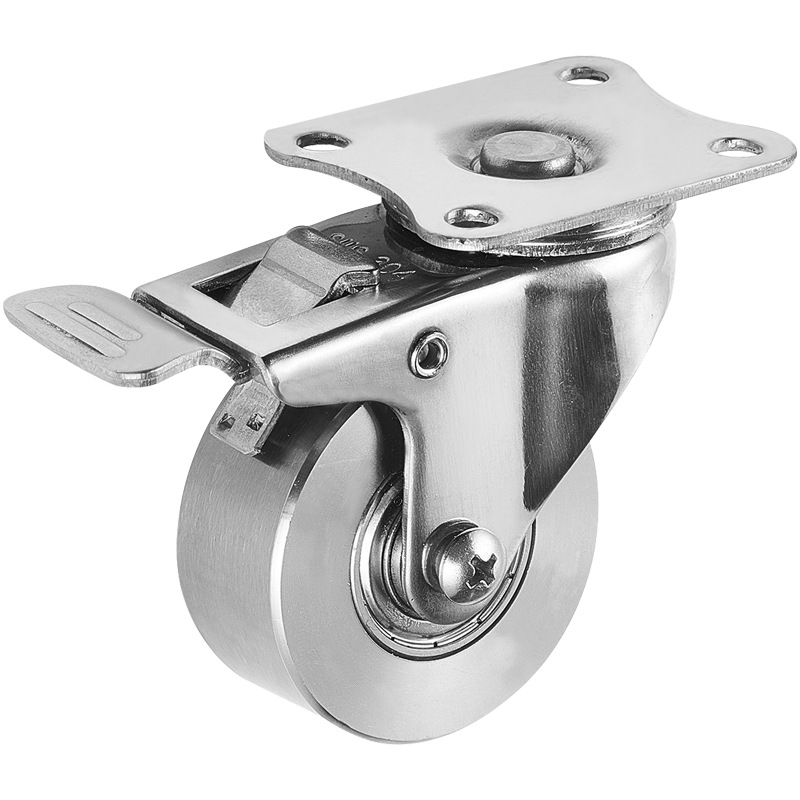
- Temperature Tolerance: Up to 315°C (600°F) or higher
- Best For: Extremely demanding applications that require both heat resistance and high load-bearing capacity.
- Material Characteristics:
- Forged steel is renowned for its toughness and ability to withstand high-impact and high-temperature environments.
- The material can handle heavy loads and maintain performance under temperatures where other materials might fail.
- Applications: Used in heavy industrial environments like steel mills, hot rolling, and heavy machinery sectors, where both heat resistance and strength are essential.
4. Why Are Heat Resistant Castor Wheels Important for High Temperature Applications?
Heat resistant castor wheels are crucial in environments where temperatures can exceed the limits of standard materials. Regular wheels, when exposed to high heat, tend to soften, melt, or lose their shape, resulting in equipment failures and potential safety hazards.
4.1. How Heat Resistant Castor Wheels Prevent Breakdowns:
- Prevention of Material Degradation: Heat resistant materials like phenolic resin, glass-filled nylon, and cast iron do not melt or warp in high temperatures. This ensures that the wheel can maintain its load-bearing capacity and functionality.
- Longer Operational Life: These wheels can handle the extreme conditions for a prolonged period without the need for frequent replacements, reducing the overall cost of ownership.
- Increased Safety: With high-heat exposure, the risk of wheel failure increases significantly. Heat resistant wheels prevent accidents caused by sudden breakdowns, ensuring safer working environments.
5. What Industries Use Heat Resistant Castor Wheels?
Heat resistant castor wheels are used across a wide variety of industries that require mobility in high-temperature environments. Here are some key sectors where these wheels are indispensable:
5.1. Baking and Food Production:
In bakeries and food production facilities, trolleys, trays, and carts are constantly exposed to heat in industrial ovens. Heat resistant wheels are used to support these moving parts and ensure smooth operation without breakdowns.
- Temperature Range: Often around 175°C (350°F) – 230°C (450°F).
- Example: Bakery racks and pizza oven trolleys.
5.2. Metalworking and Foundries:
In industries like metalworking, steel mills, and foundries, heat resistant castor wheels are essential for moving heavy materials or equipment that are exposed to intense heat from furnaces or molten metals.
- Temperature Range: Up to 315°C (600°F).
- Example: Furnace carts, steel ingot handling, and other heavy-duty metal processing applications.
5.3. Autoclaves and Sterilization:
Medical and laboratory environments often use autoclaves to sterilize equipment at temperatures exceeding 230°C (450°F). Heat resistant castor wheels enable smooth operation of sterilizing units while they endure high pressure and heat.
- Temperature Range: Around 230°C (450°F) or higher.
- Example: Hospital autoclaves, laboratory sterilizing equipment.
5.4. Other High-Temperature Manufacturing Sectors:
Other industries that rely on heat resistant castor wheels include aerospace, automotive, and glass manufacturing. Each requires specialized wheels for equipment that operates under high temperatures.
6. What Temperature Range Do Heat Resistant Castor Wheels Support?
Heat resistant castor wheels come in different materials that support varying temperature ranges. Here’s an overview:
6.1. Glass-filled Nylon
- Temperature Tolerance: Up to 175°C (350°F). Suitable for light-duty applications in moderately heated environments.
6.2. Phenolic Resin
- Temperature Tolerance: Up to 230°C (450°F). A great option for medium-duty applications in hotter environments.
6.3. Cast Iron
- Temperature Tolerance: Up to 315°C (600°F). Ideal for heavy-duty, high-heat applications like metalworking and foundries.
6.4. Forged Steel
- Temperature Tolerance: Up to 315°C (600°F) or higher. Used in extreme temperature conditions, typically with heavy loads.
7. How to Choose the Right Heat Resistant Castor Wheels?
Choosing the right heat resistant castor wheel depends on several factors. Here’s how to make an informed decision:
7.1. Load Capacity
Ensure the wheel can bear the load of your equipment. This is essential for ensuring that the wheel does not fail under pressure.
7.2. Temperature Resistance
Match the material’s heat tolerance to the maximum temperature your equipment will be exposed to.
7.3. Floor Compatibility
Consider the type of flooring in your facility. Some materials may perform better on smooth surfaces, while others are better suited to rough or uneven floors.
7.4. Budget
While heat resistant wheels have a higher initial cost, they provide long-term savings by reducing downtime and maintenance.
8. Best Brands and Models of Heat Resistant Castor Wheels
Some of the top brands offering high-performance heat-resistant castor wheels include:
8.1. Caster City
A trusted name in industrial wheels, Caster City provides heat resistant castor wheels designed for a variety of high-temperature applications.
8.2. Blickle
Blickle specializes in providing wheels that are heat-resistant and durable, catering to industries that require heavy-duty solutions.
8.3. Colson Casters
Offering a wide selection of high-quality wheels, Colson Casters includes models designed to resist extreme heat, ensuring smooth operations in manufacturing environments.
8.4. Techin
Techin offers a range of wheels that can withstand high temperatures without compromising on strength and reliability. Known for their durability in demanding environments, Techin wheels are ideal for industries like automotive, food production, and metalworking.
9. Conclusion
If you run a business where high temperatures are a normal part of daily operation, heat resistant castor wheels are an investment worth making. No matter if you’re in the food business, metalworking or are in charge of medical sterilization, these wheels will provide the strength, safety and reliability you need to keep things running smoothly. You should consider the load capacity, material type and temperature tolerance when choosing the right heat resistant castor wheel to make sure you pick the perfect match for your specific operations.
If you need high-quality heat resistant castor wheels for your business, the heat resistant castors from Techin are a great choice. They are built to withstand the hottest of hot temperatures and will last a really long time as part of your daily operations.
For more questions or needs, reach us at:
- Email: info@techincastor.com
- Tel/WhatsApp: +86 13417057114

